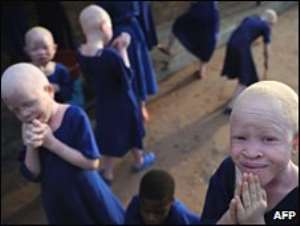
Tanzania is launching a nationwide exercise urging the public to identify those behind dozens of murders of people with albinism.
In the secret "referendum", citizens will be invited to write down on slips of paper the names of those they suspect of involvement.
Legal officials will gather the names and pass them to the police.
President Jakaya Kikwete said the public should not fear retribution for naming the culprits.
The killers reportedly sell albino body parts - including limbs, hair, skin and genitals - to witchdoctors who make potions promising to make people wealthy.
In the past 15 months, 45 albinos have been slaughtered in Tanzania.
'Political ploy'
But there are concerns the process could be flawed and lead to accusations against innocent people.
Edmund Sengondo Mvungi, a law lecturer at Dar es Salaam University, told the BBC News website: "When you invite people to accuse their neighbours of such a serious crime, you give them the opportunity to settle scores.
"This shouldn't be subjected to a vote-like process. It's a political ploy to please those who say the government is not doing enough to solve these murders."
President Kikwete announced the nationwide exercise during his end of the month speech on Saturday.
It will start within the next fortnight in the Lake Zone regions of Mwanza, Kagera, Mara and Shinyanga - where 44 out of the 45 albino murders have taken place.
Superstitious miners and fishermen in the region hoping to get rich quick have been accused of fuelling the demand for the potions.
The exercise will then continue in phases throughout the southern highlands, central, western, eastern, and northern regions, said the president.
"Our idea is to ensure the problem is eliminated and the country's image to the international community is cleansed," Mr Kikwete said on national TV.
"People should feel free to name those who are behind these barbaric killings and other criminal acts within their localities."
Boasting
Prime Minister Mizengo Pinda, who recently wept in parliament as he bewailed the albino murders, is to launch the campaign.
The BBC's Vicky Ntetema in Dar es Salaam says it is not clear how effective the exercise will be in a society which believes in witchcraft and whose confidence in the legal system is wearing thin.
A recent BBC investigation found some witchdoctors openly boasting that they were working with the police.
Our reporter says more than 200 people - including alleged witchdoctors, their clients, hired killers and some of the victims' relatives - have been arrested in connection with the killings in the last year.
No-one has so far been convicted, she says.
The United Nations Secretary General Ban Ki-moon last week decried the albino killings during his official visit to the country.
Last week, in neighbouring Burundi, assailants reportedly dismembered a six-year-old albino boy in his home in front of his parents, the eighth albino killing in that country.
The government issued a ban on all traditional healers in January in an effort to stop the killings and several have been arrested since then on suspicion of flouting the order.
Last month, a pastor was charged in Tanzania with being found in possession of the body parts of an albino.




 Lay KPMG audit report on SML-GRA contract before Parliament – Isaac Adongo tells...
Lay KPMG audit report on SML-GRA contract before Parliament – Isaac Adongo tells...
 Supervisor remanded for stabbing businessman with broken bottle and screwdriver
Supervisor remanded for stabbing businessman with broken bottle and screwdriver
 NDC watching EC and NPP closely on Returning Officer recruitment — Omane Boamah
NDC watching EC and NPP closely on Returning Officer recruitment — Omane Boamah
 Your decision to contest for president again is pathetic – Annoh-Dompreh blasts ...
Your decision to contest for president again is pathetic – Annoh-Dompreh blasts ...
 Election 2024: Security agencies ready to keep peace and secure the country — IG...
Election 2024: Security agencies ready to keep peace and secure the country — IG...
 People no longer place value in public basic schools; new uniforms, painting wil...
People no longer place value in public basic schools; new uniforms, painting wil...
 'Comedian' Paul Adom Otchere needs help – Sulemana Braimah
'Comedian' Paul Adom Otchere needs help – Sulemana Braimah
 Ejisu by-election: Only 33% of voters can be swayed by inducement — Global InfoA...
Ejisu by-election: Only 33% of voters can be swayed by inducement — Global InfoA...
 Minority will expose the beneficial owners of SML, recover funds paid to company...
Minority will expose the beneficial owners of SML, recover funds paid to company...
 Prof. Opoku-Agyemang has ‘decapitated’ the NPP’s strategies; don’t take them ser...
Prof. Opoku-Agyemang has ‘decapitated’ the NPP’s strategies; don’t take them ser...
